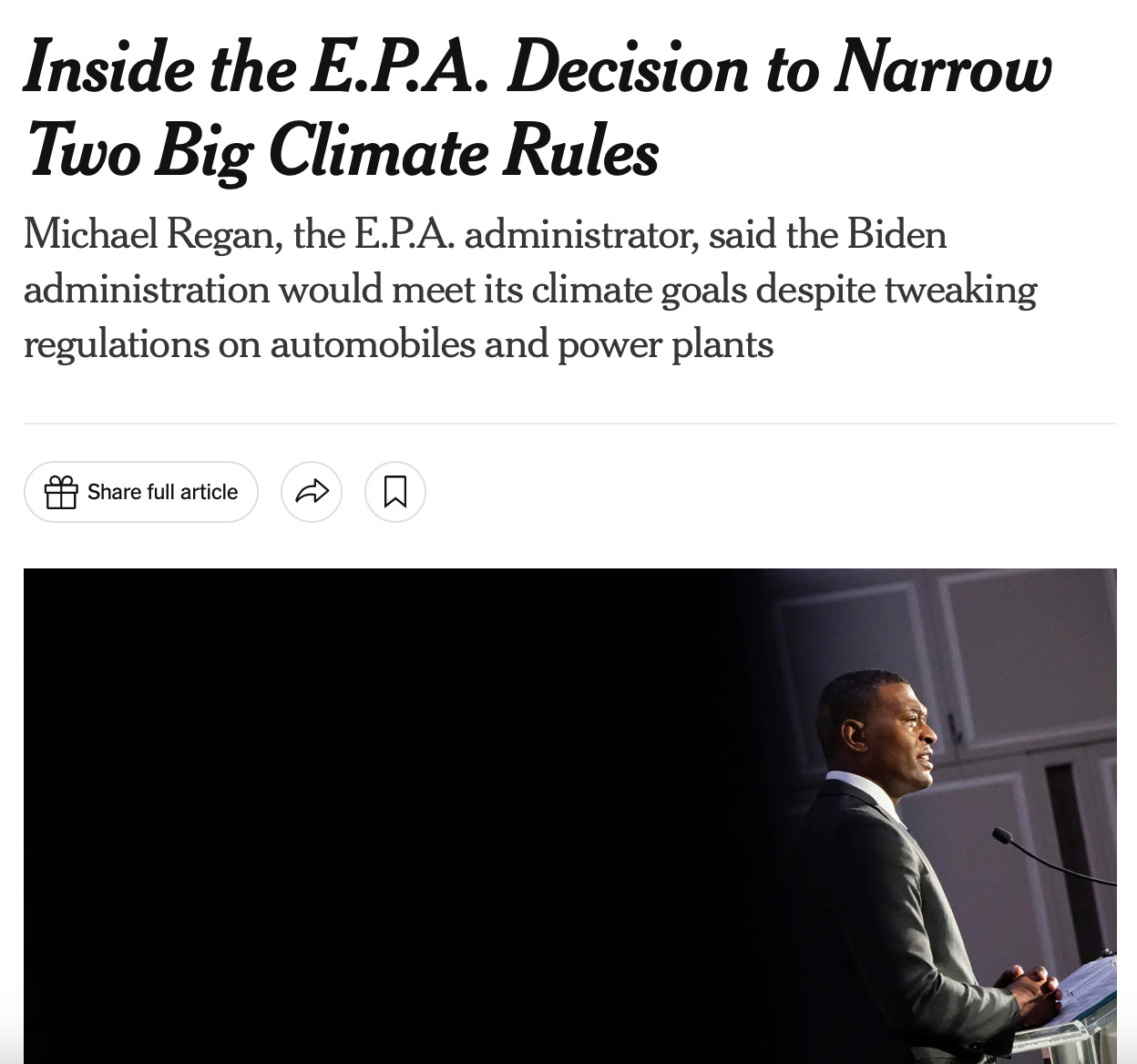Melting climate policy to melt glaciers
The either-or mismatch of policy, reality and the role of government in a climate crisis. Again
Last week, the US EPA made it easier for polluters to continue doing what they do best and showed government policy to be the climate waffler it is by:
Making strong climate pronouncements to curb the fossil fuel sector in May 2023 only to backtrack those plans on the eve of a federal election in 2024.
As reported in the New York Times Mar. 1,
"The Environmental Protection Agency said it would delay a regulation to require gas-burning power plants to cut their carbon dioxide emissions, likely until after the November election. The agency also is expected to slow the pace at which car makers must comply with a separate regulation designed to sharply limit tailpipe emissions."
When Bank of Nature talks about government being ill-suited to lead on climate, this new EPA flip flop is a vivid example. Growth-centric government has neither the DNA nor the scale to do it. That's not throwing “sticks and stones”, but stating the obvious. A climate impasse is the government working to spec.
Michael Regan, the administrator of the neutered, post-Trump EPA, says in the same article:
“The way we view it, we’ve actually strengthened our climate approach to power plants. We are definitely moving forward with one of the strongest regulations that existing coal and new natural gas will face.
Operative words:
“Will” (meaning not now or not yet, possibly never-ever)
“One of” (not the best idea among unimpressive competitors)
“Definitely” (hardly "resolutely" and, at best, “sort of”)
“View” (politically expedient opinion not supported by action)
“Approach” (the appearance of strategy without the strategy)
Only a politician can defang a relevant climate strategy and call it “strengthened”.
The EPA news focused on maintaining the status quo for existing, operating plants in order to protect marginalized communities most directly impacted by crimps on oil- and gas-generated energy units.
Reports the NYT article:
"Mr. Regan… said his decision was based solely on the concerns that the original rule could be harmful to marginalized communities. He said the message from those communities was “don’t pursue climate goals at our expense.”
I’m not naïve to the demands of the ballot box. I don’t want another Trump White House either. If the EPA wants to be a Biden reelection team player, then perhaps soft-pedaling on climate policy in favor of energy constancy is a way to do it. That said, why not say so, as in:
"We have to renege on climate promises because we know they are a threat to the election outcome and another term with Trump. It's a strategy. Allowing the US status quo to continue to eat away at the future is a necessary trade off to fend off something even worse. The fossil fuel lobbyists have made it clear the volumes of dark money they'd put behind Trump to penalize Biden for investing in climate security to the best of government’s ability. "
To be clear, Regan did not say that. Instead, in the world of “this is how it really works”, Regan punts the issue in ways no better than what Trump and his anti-climate cronies would do — only without the drill-baby-drill hullabaloo.
Of course, we should not screw a demographic in favor of a better climate outcome. But, that’s not what is happening here. Evoking a social schism created in part by the way a fossil fuel economy works as justification for maintaining the injustice is just tone deaf electioneering. Never mind that it doesn’t protect any group, regardless of one’s privilege, at the end of the climate story.
There are 200 nation states with varying degrees of concurrence with the EPA’s struggle to marry the peculiarities of running government, that is unable to keep up with all of its priorities, with the needs of an extra-national crisis that knows no sovereign boundaries or competitive self-interest.
It's an impossible situation for any government. Yet, climate activists rely on this type of government to address the climate crisis.
This is where Bank of Nature argues, "Isn’t it time for a different climate hero with clear, resolute strategies that offer the best opportunity to lead toward climate security because it is tailor-made for the job?"
Because pensions with legally-defined fiduciary money work globally, are not bound by national borders, are collaborative and have vast financial resources to make good on a contracted promise that already extends to the 22nd Century, they are everything that an EPA is not: Free to make climate choices without the political penalties and because they can.
That’s the opportunity. Yes, government has a role: Legislation, policy and incentives in support of fiduciary money as a climate remedy. After that, government can get out of the way.








Politics and the Capital Markets are 20th Century social innovations evolved for meeting the 20th Century challenges of being human at the scale of the nation-state.
In the 21st Century we are facing a new challenge, of being human on a planetary scale.
Politics and the Capital Markets are not equal to that challenge.
We need a new social innovation, that is.